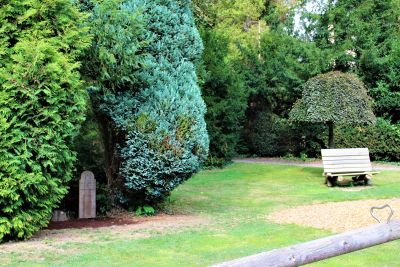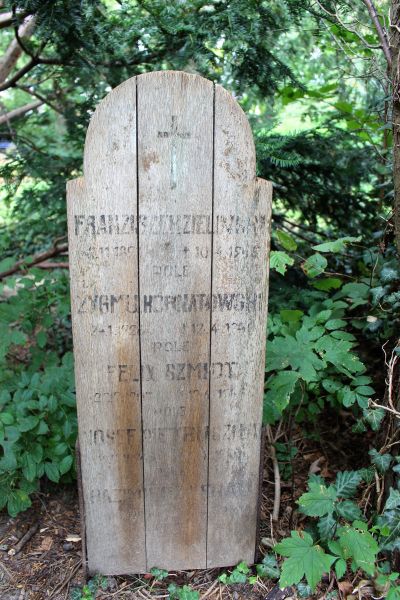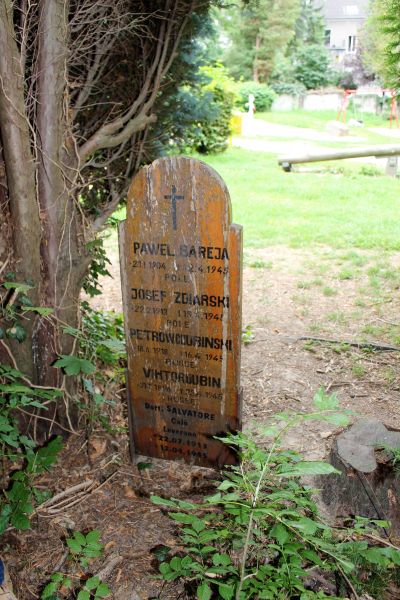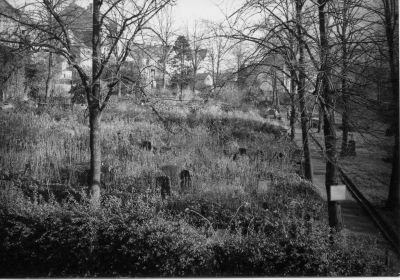The ten forgotten faces in the park
A list of graves under Section 5(1) of the Burial Act of 1 July 1965 for publicly tended graves in the administrative district of Arnsberg contains a “collective grave” listed as being 8 m² and housing “more than 10 civilians (foreign workers), who died whilst working in Germany in the Second World War”. This list of graves was signed by Wetter’s municipal director Willi Reiber on 16 November 1970. Graves of this kind are permanent and are to be cared for and maintained by the respective states and local authorities for which the federal government assumes the costs.[2] The site with its old headstone lies hidden under tall conifers in a small park in the heart of the small town.
Sunlight has increasingly faded the five inscriptions on the wooden headstone and made them hard to read:
1 Franziszek Zielinski, born 3 November 1891, died 10 April 1945
2 Zygmund Kornatowski, born 24 January 1926, died 12 April 1945
3 Felix Szmidt, born 17 June 1907, died 12 April 1945
4 Josef Pietruszka, born 19 March 1896, died 12 April 1945
5 Kazimierz Legau, born 4 April 1904, died 12 April 1945
In each case, the nationality “Pole” has been added next to the birth and death dates which are barely legible.[3] (Fig. 2)
If you make your way through the undergrowth and rubbish, you will find five more inscriptions on the back of the headstone, two of them again being Poles. They are:
1 Pawel Bareja, born 23 January 1904, died 12 April 1945
2 Josef Zdziarski, born 22. February 1913, died 15 April 1945
All seven Poles hailed from Warsaw and its surrounds. Their professions were listed as “labourers”, both on the Arnsberg list of graves and on the death certificates. When they died, the oldest was 54 years old (Franziszek Zielinski), the youngest only 19 (Zygmund Kornatowski). All were Catholic, the youngest was still unmarried; the names and places of residence of the wives of six of the Poles were given on the death certificate as “unknown”. Presumably, no attempt was made to find relatives – not even the parents of the youngest victim.
The three other people interred there are:
3 Petrow Chubrinski, born 18 June 1918, died 16 April 1945
4 Victor Dubin, born 31 January 1896, died 13 April 1945
5 Dott. Salvatore Calò, born 22 July 1913, died 12 April 1945[4]
Petrow Chubrinski, native of the Ukraine, was also listed as a labourer, Victor Dubin from Stalingrad was a camp warden. Both were registered as having no religion. Dottore Salvatore Calò, Catholic, hailed from Leverano. Friends did not add the name, profession and title, date of birth and place of origin of the 32-year-old Italian doctor to the wooden headstone until long after his death.[5] (Fig. 3)
Many of the dates on the headstone do not correspond to the archive material. There are also discrepancies between the death certificates, list of graves and an older publication of the former municipal archivist. In this case, with the exception of Salvatore Calò, the author refers to the death certificates because the migration of the working foreigners was officially registered.
[1] The town is proud to be associated with the life and work of the important industrial pioneer Friedrich Harkort, who, more than 200 years ago, founded the Mechanische Werkstätte Harkort & Co high above the river, which would later merge with the Deutsche Maschinenbau Aktiengesellschaft (DEMAG);
cf. Struchtemeier, Thea: Die Stadt Wetter an der Ruhr ist eine Wiege der Industriekultur – Ein Rundgang in der Freiheit, in: Lokalkompass.de, 15/5/2019, https://www.lokalkompass.de/bochum/c-kultur/die-stadt-wetter-an-der-ruh…; (last accessed on 11/10/2021).
[2] For the perpetual right to a resting place for victims of war and tyranny (Graves Act), see especially Sections 1, 2, and 10.
[3] Because the panels were so weatherbeaten, the author consulted the death certificates in the Wetter/Ruhr municipal archive for the correct birth and death dates.
[4] The death certificate for the Italian doctor Salvatore Calò is incomplete stating, “First name unknown”. Indeed, the surname was unknown and was later amended, see more Note 5.
[5] Görzel, Klaus: Fünf Mal “Herzschwäche” an nur einem Tag, Westfalenpost, 18/11/2014.






